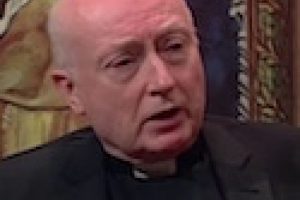Column: From the Pastor
All creation emanated from the voice of God uttering: “Let there be light.” There was nothing and no one yet to hear it, only God himself. As animate creatures came into being, they were able to make sounds, and some of them are beautiful, but only human beings have the gift of being able to consciously praise God by a right use of intellect and will.
One of the Advent mysteries is “Judgment” and, in addition to our Creator’s assessment of us, it includes the use of speech as a correct expression of human dignity. To “take the Lord’s name in vain” does not diminish God, who is eternal, but it does corrupt our dignity in relation to him as his sons and daughters. Poor Job’s wife knew this when she told him, albeit ill-advisedly, “Curse God and die!” (Job 2:9).
If we use profane language, our Creator does not wash our mouths with soap, but he becomes less accessible to us. “Profane” actually means “outside the temple.”
Our culture is degraded by an increasing use of vulgar speech. There are plenty of artful ways to insult, but when script writers and stand-up comedians resort to coarseness, they reveal their lack of verbal skill, not to mention their lack of self-respect. It is worse for a woman to use vulgar language than for a man. If this is a double standard, it is so in a good sense, for by nature the female is meant to civilize the male. Invoking Eusebius of Nicomedia, and Aristotle before him, “The corruption of the best is the worst.”
Cole Porter remarked on this degradation even back in 1934 in a somewhat insouciant way: “Good authors, too, who once knew better words, / Now only use four-letter words. / Writing prose, / Anything goes.”
One way to discipline the use of speech is to make a quiet act of reparation when someone curses. Simply utter to yourself the holy name of Jesus. Save for the angels, we are the only creatures who can do that.
While Advent hymns are often blocked out by Christmas music sung too early, they are among the Church’s most beautiful sounds, giving voice to the anticipation of Christ’s birth and the prospect of his Second Coming. Among them is one translated by Edward Caswall, an Oxford classics scholar who converted to Catholicism in 1847 and joined John Henry Newman’s Oratory in Birmingham three years later.
There is nothing in Cawall’s vocabulary that needs to be bleeped or asterisked, although such speech may confuse and even scandalize those in our present day who grunt like animals instead of singing like humans, who are—after all—only a little lower than the angels:
Hark! A thrilling voice is sounding;
“Christ is nigh,” it seems to say;
“Cast away the works of darkness,
O ye children of the day!”
————
Fr. George Rutler, S.T.D., is a brilliant scholar, author, convert, former pastor of Our Saviour in Midtown Manhattan, now pastor of St Michael’s parish in Hell’s Kitchen, New York City. A donation of any amount may be made to the parish at: www.StMichaelNYC.com.
View Articles Father Rutler was ordained to the diaconate in Rome by His Eminence William Cardinal Baum in 1980 and received priestly ordination in St. Patrick's... MORE »



You must be logged in to post a comment.